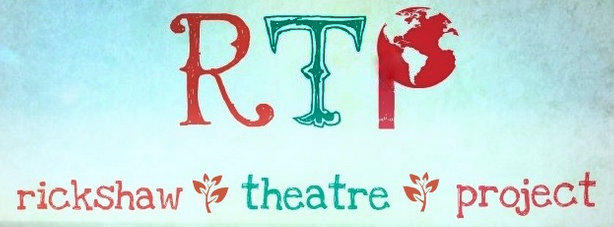Here in Lucknow, Jessie, Nkoko and I are working at Puran Shiksa
Kendra, a free, no-pressure school for slum children from the local
area. No pressure means no uniform, no homework, nothing that might put
the children off coming to school. Since its foundation in 2007, the
number of children who attend has grown to around 120. The school
consists of one office, 3 classrooms and a garden.
Working at Puran had its significant challenges. For starters, the
no-pressure system means that not all the children come every day, and
so the group we were working with fluctuated accordingly – this is fine
when doing workshops, where the material was different each time, but it
meant that once we started rehearsing we had to be extremely flexible,
re-blocking and re-assigning roles and lines a little bit each day, or
deciding to take a gamble, leaving things as they were and hoping the
missing actor would be back the next day. What’s more, even kids that
had shown up were free to come and go as they pleased, and kids that
weren’t in our group could wander out of a lesson and join in.
Next was the issue of space – with only 3 classrooms there was rarely
one to spare, so almost every day we would workshop and rehearse in the
garden, following the shade slavishly as far as possible. I have NEVER
sweated so much in my life. I sweated so much I stopped (almost)
noticing I was sweating. We tried to start before the sun was too high,
but from 11am-4pm was pretty much consistently boiling. Another downside
to being in the garden was that all the children not involved in our
workshops could see us, distracting them from their lessons and
distracting our group from their workshop.
Finally (I have to stop somewhere) there was the language barrier. I
found this a much bigger problem than in Jan Madhyam, because of the
size (25 compared to the 10 or so we had in Delhi) and the rowdiness of
the group. Luckily, we had 3 translators and 2 members of the
Lucknow-based theatre group JOSH on hand – of course sometimes this many
people trying to help also felt like an obstacle, but the fact is we
would have been hard pressed to put on a show without them.
For the performance, we took inspiration from the street theatre we
saw performed by university students in Delhi – we wanted to create that
same connection with the audience, the same infectious energy. Ideally
we would come up with a chant based on the kids’ own demands, a rallying
cry like the ones being shouted all over India at the anti-corruption
protests in support of Anna Hazare. We asked them what they didn’t like
about their world – at first it was hard to get any answers, but after
some coaxing and explaining we got a few answers: Pollution and
littering, drunkenness, dishonesty and stealing. Using a Hindi song in
which a child demands to be taken seriously, and the chorus “If you
wanna be somebody, if you wanna go somewhere, you better wake up and pay
attention” from Sister Act as the chants, we created a 15 minute
performance incorporating the skills we had taught in the workshops. All
the children were onstage throughout, forming a semi-circle around the
edge of the thrust and reacting to the action if they were not involved
in the scene. This was the hardest thing for them to grasp – that even
if you’re not centre stage, you have to be fully engaged and still
performing.
I wish we could have had more time at Puran, but in the two weeks we
were there, our rowdy, ever-changing group became a dedicated little
cast, demanding that we rehearse more, more, MORE even we were literally
ready to drop – and their performance on Saturday reflected their
dedication and earnt them a huge round of applause. I was very sad to
say goodbye.
















